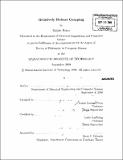Relatively robust grasping
Author(s)
Hsiao, Kaijen
DownloadFull printable version (24.96Mb)
Other Contributors
Massachusetts Institute of Technology. Dept. of Electrical Engineering and Computer Science.
Advisor
Tomás Lozano-Pérez and Leslie Kaelbling.
Terms of use
Metadata
Show full item recordAbstract
This thesis presents an approach for grasping objects robustly under significant positional uncertainty. In the field of robot manipulation there has been a great deal of work on how to grasp objects stably, and in the field of robot motion planning there has been a great deal of work on how to find collision-free paths to those grasp positions. However, most of this work assumes exact knowledge of the shapes and positions of both the object and the robot; little work has been done on how to grasp objects robustly in the presence of position uncertainty. To reason explicitly about uncertainty while grasping, we model the problem as a partially observable Markov decision process (POMDP). We derive a closed-loop strategy that maintains a belief state (a probability distribution over world states), and select actions with a receding horizon using forward search through the belief space. Our actions are world-relative trajectories (WRT): fixed trajectories expressed relative to the most-likely state of the world. We localize the object, ensure its reachability, and robustly grasp it at a specified position by using information-gathering, reorientation, and goal-seeking WRT actions. This framework is used to grasp objects (including a power drill and a Brita pitcher) despite significant uncertainty, using a 7-DOF Barrett Arm and attached 4-DOF Barrett Hand equipped with force and contact sensors. Our approach is generalizable to almost any sensor type, as well as wide ranges of sensor error and pose uncertainty.
Description
Thesis (Ph. D.)--Massachusetts Institute of Technology, Dept. of Electrical Engineering and Computer Science, 2009. Cataloged from PDF version of thesis. Includes bibliographical references (p. 135-138).
Date issued
2009Department
Massachusetts Institute of Technology. Department of Electrical Engineering and Computer SciencePublisher
Massachusetts Institute of Technology
Keywords
Electrical Engineering and Computer Science.